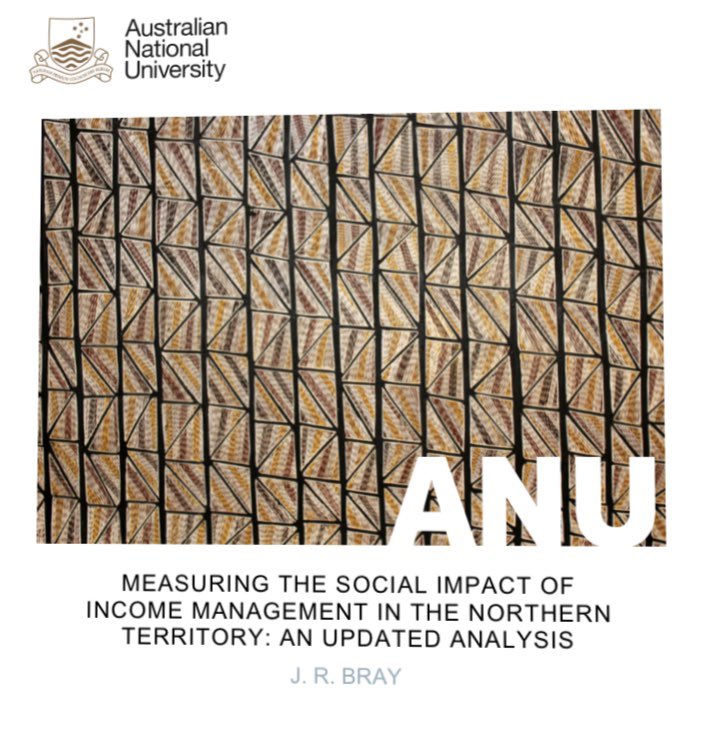 A major survey of the social impact of compulsory income management (CIM) has found that the policy failed to achieve any systematic community level improvements in outcomes for the Indigenous population of the Northern Territory.
A major survey of the social impact of compulsory income management (CIM) has found that the policy failed to achieve any systematic community level improvements in outcomes for the Indigenous population of the Northern Territory.VANGUARD - Expressing the viewpoint of the Communist Party of Australia (Marxist-Leninist)
For National Independence and Socialism • www.cpaml.org
 A major survey of the social impact of compulsory income management (CIM) has found that the policy failed to achieve any systematic community level improvements in outcomes for the Indigenous population of the Northern Territory.
A major survey of the social impact of compulsory income management (CIM) has found that the policy failed to achieve any systematic community level improvements in outcomes for the Indigenous population of the Northern Territory.
The study, released by the Centre for Aboriginal Economic Policy Research (CAEPR) of the Australian National University on July 10, is an evidence-based indictment of a racist and punitive policy imposed on NT First Peoples since 2007.
On 30 April 2007, the Report of the Northern Territory Board of Inquiry into the Protection of Aboriginal Children from Sexual Abuse (Ampe Akelyememane Meke Mekarle: Little Children Are Sacred) was released. Its policy recommendations were largely ignored and were replaced by the “emergency” action of direct Federal intervention in the affairs of remote Aboriginal communities in the Northern Territory.
Among the Intervention actions was the system of compulsory income management for First Peoples in proscribed communities. This and other measures directed solely at First Peoples required the suspension of the Australian Racial Discrimination Act. Fifty percent of welfare payments to the 70 percent of First Peoples in the proscribed areas was quarantined onto a Basics Card which limited purchases to a range of products.
Outrage at the racism inherent in the Emergency Response, including condemnation by the United Nations, saw a variation of CIM introduced in August 2010. Non-Indigenous people in the NT could now be included in CIM if their circumstances were seen to warrant it. Today, approximately 20 percent of people in the New Income Management (NIM) scheme are non-Indigenous. The scheme has also been extended to selected cities and communities outside the NT.
The findings of the CAEPR study are quoted in full below:
• Over the period since income management commenced, the rate of infant mortality amongst Indigenous people in the Northern Territory has increased. This contrasts with falls for Indigenous people nationally, and for non-Indigenous people in the Northern Territory. This group has also seen a rise in low birth weight births, and an increase in child deaths from injury. Child abuse and neglect substantiations have also increased, although it is noted this may be influenced by a willingness to report. Indigenous children in the Northern Territory have not seen the same declines in developmental vulnerability as Indigenous children elsewhere.
• The period since the introduction of income management has seen falling rates of school attendance by Indigenous children in the Northern Territory, and while some NAPLAN results have improved for these children, others have not. Where there have been gains these are smaller than those for Indigenous children nationally.
• There is strong evidence of a decline in alcohol consumption in the Northern Territory. This is a trend that pre-dates the introduction of income management. Research identifies a range of policies, including pricing and supply limitations, which appear to be significant. Notwithstanding this, Indigenous people did not report a lower rate of risky drinking in 2014–15 than they did in 2002, and alcohol-related emergency department presentations have increased.
• Rates of assaults appear to be largely flat, although there is a decline in assaults associated with alcohol. No consistent pattern of declining crime is identifiable in data from 2007 onwards, although there is evidence of particular alcohol restriction enforcement activities directly impacting some crimes. The rate of imprisonment of Indigenous people in the Northern Territory has continued to rise strongly across the period of income management.
The CAEPR findings strongly support demands for the cessation of CIM schemes in the NT and those other communities brought under its purview.
The bourgeoisie must stop treating people impoverished by neo-colonial land theft, and by the general operation of the capitalist system, as criminals who need to be subjected to coercive measures of punishment and control.
Stop compulsory income management!
Black control of black affairs!
Black and white – unite to fight for independence and socialism!